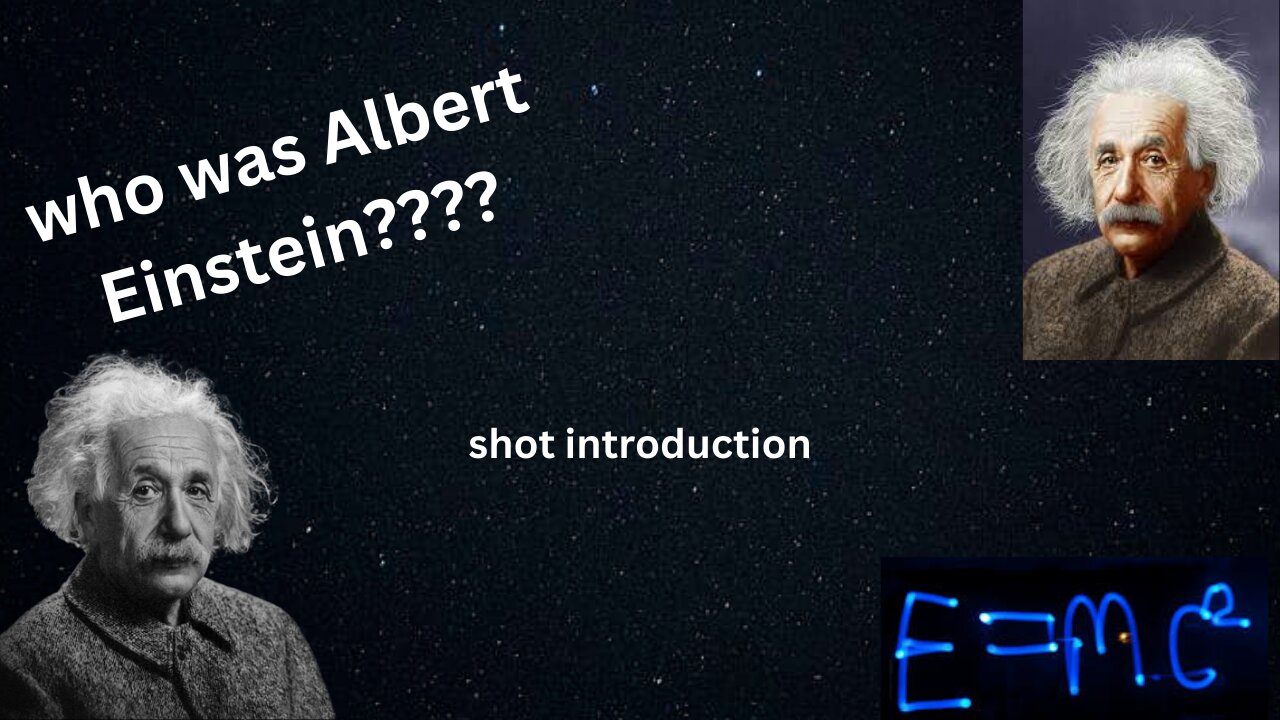Premium Only Content

The Einstein Introduction | Albert Einstein
Albert Einstein was a German-born theoretical physicist who is widely regarded as one of the most brilliant and influential scientists of all time. He was born on March 14, 1879, in Ulm, Germany, and he passed away on April 18, 1955, in Princeton, New Jersey, USA.
Einstein's groundbreaking work in physics revolutionized our understanding of the universe. He is best known for his theory of relativity, which consists of two major parts: the special theory of relativity and the general theory of relativity. These theories transformed the way we perceive time, space, gravity, and the relationship between matter and energy.
His equation, E=mc² (energy equals mass times the speed of light squared), is perhaps the most famous equation in the world and is a cornerstone of modern physics.
Einstein received the Nobel Prize in Physics in 1921 for his explanation of the photoelectric effect, which laid the foundation for the development of quantum mechanics.
Beyond his scientific contributions, Einstein was also an outspoken advocate for peace, civil rights, and social justice. He used his platform to speak out against nuclear weapons and was a strong supporter of international cooperation to prevent conflict.
Einstein's legacy continues to impact science, philosophy, and society. He remains an iconic figure whose work has left an indelible mark on our understanding of the cosmos.
-
 1:08:55
1:08:55
vivafrei
22 hours agoExposing the Trans MADNESS in Maine School Boards! Live with Activist and Truth Teller "Corn Pop"!
92.4K18 -
 1:50:18
1:50:18
The Quartering
3 hours agoWhat The Heck Is Even Happening?
97.4K21 -
 1:16:59
1:16:59
iCkEdMeL
2 hours ago $5.08 earnedICE SHOOTS Popular TikToker ‘Richard’ During Raid in South L.A.?! 😳 What Really Happened LIVE
19.3K10 -
 16:57
16:57
Clownfish TV
10 hours agoLord of the Rings is RACIST Again According to UK College Course... | Clownfish TV
4.62K13 -
![[Ep 774] Trump’s Ballroom Blitz | 9th Circuit OK’s Guard in Portland | Guest: Sam Anthony](https://1a-1791.com/video/fww1/00/s8/1/2/Z/E/s/2ZEsz.0kob-small-Ep-774-Trumps-Ballroom-Blit.jpg) LIVE
LIVE
The Nunn Report - w/ Dan Nunn
2 hours ago[Ep 774] Trump’s Ballroom Blitz | 9th Circuit OK’s Guard in Portland | Guest: Sam Anthony
168 watching -
 1:05:27
1:05:27
DeVory Darkins
4 hours ago $35.54 earnedTrump scores HISTORIC IMMIGRATION WIN as Democrats STUNNED by ballroom renovations
118K57 -
 43:40
43:40
The Rubin Report
3 hours agoDark Future Predictions & Exposing the Truth About Australia’s Past | Tony Abbott
36.2K13 -
 1:57:45
1:57:45
The Charlie Kirk Show
5 hours agoThis is What Democracy Looks Like + Oxford Union Election Fraud? | Dr. Orr, Ogoloma, Harmon | 10.21
89.8K30 -
 26:07
26:07
Lady Decade
12 hours agoGaming Feminists Just Discovered Islam - & It’s Not Going Well
36.8K11 -
 3:52
3:52
Michael Heaver
4 hours agoErupting UK Voters Send FEROCIOUS Message
16.5K8